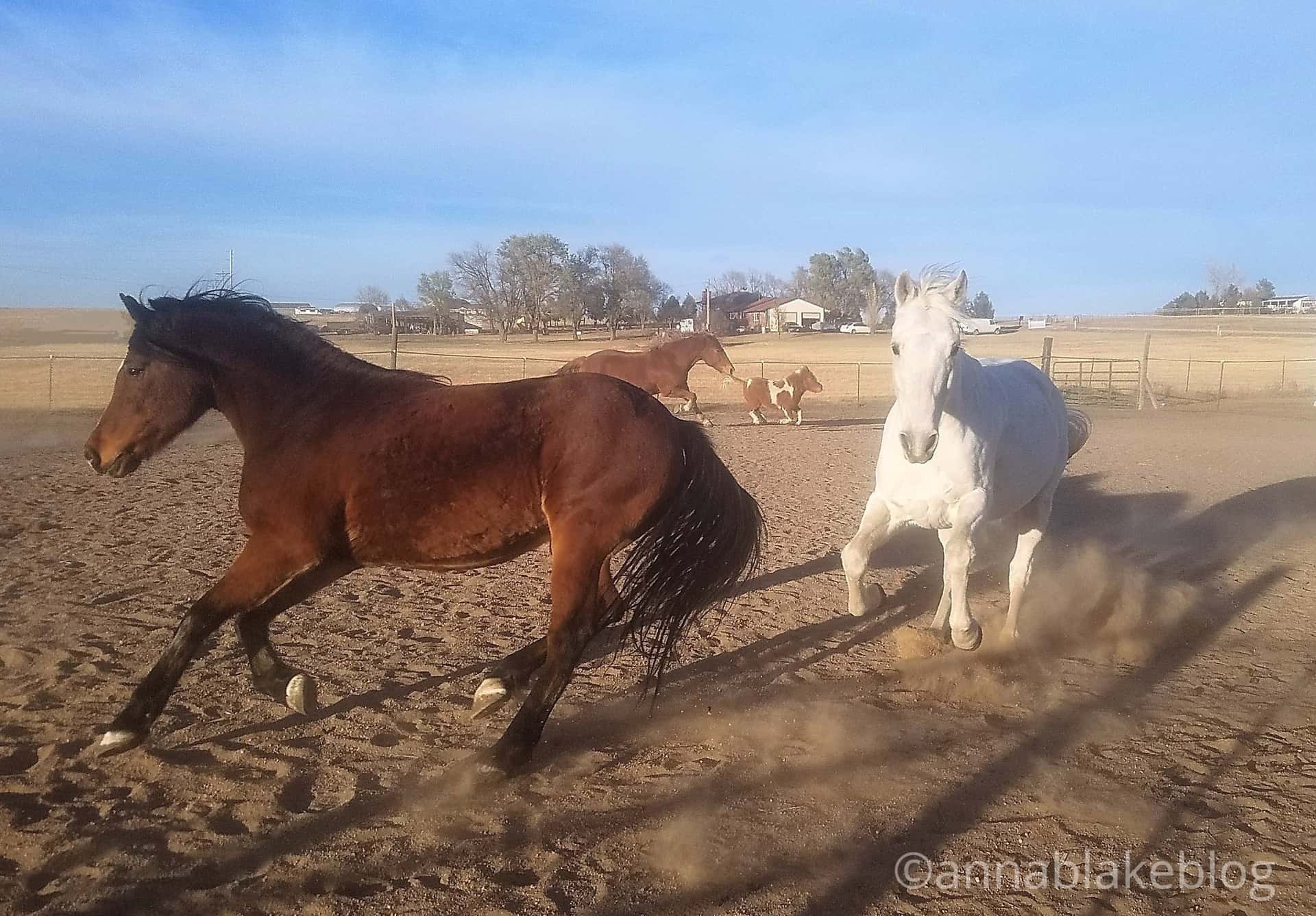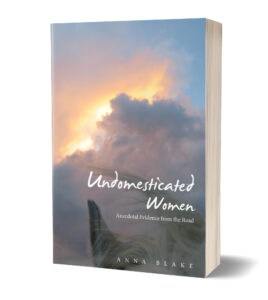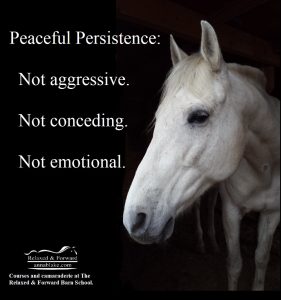
When I first moved to my farm, I pretended to be Jane Goodall. My land was a high desert prairie, not the jungle, and my species was horses and hers were chimps. But I focused on what we had in common. It was always about curiosity and learning.
I was a kid when I first saw chimps on TV dressed up in clothes and smoking cigars. My feelings jumbled uncomfortably, and I didn’t have the words. I thought maybe I didn’t like chimps. That was silly, of course. What I didn’t like was what humans did to them. I never got the joke. As I got older, I learned about Goodall and the idea of studying animals in their natural habitats. Like most of you, I’ve read dozens of books on all species, from elephants to octopuses, in the years since, but she was the first. In my mind, she is the best.
Chimps have social habits so similar to us that it’s alarming. They cuddle their young, groom and hug each other affectionately, and get angry, facing each other and screaming in a fight. All things we humans do. But then humans and chimps share 98.8 percent of their DNA. We are literally the chimps in clothes, smoking.
Chimps are similar enough to humans that it’s almost acceptable to attribute human characteristics to them. Others were insulted to be compared to chimps. But the slight difference in DNA is huge in reality. One of my favorite videos shows Goodall releasing a chimp, Wounda, after they rehabbed her. Watch this short video. Goodall got to cuddle her species, and for all the horses I’ve rehabbed, I have never gotten a hug like that.
It’s logical. Horses share less than half our DNA, and don’t have arms. They don’t make sounds for language or have hands. They are strictly prey animals, forever in survival mode. Horses are profoundly different in their nature than chimps. Or us.
You might still be certain that even if horses don’t hug me, your horse certainly hugs you. That’s fine. But why is a horse trainer wasting all these words talking about chimps, you ask? I’m coming at an old question from a different perspective. I’m sneaking up from behind.
The Goodall video was romantic and sweet, but it didn’t give enough credit to the years of study Goodall put into learning chimp body language through jungle research. It had to be like an immersive Berlitz course, and it worked partly because Goodall looked a bit like a pasty chimp herself. We shouldn’t judge the vast quantity of work by these few seconds of heavily edited video, as her disclaimer stated, don’t try this at home. That chimp looked strong. Did you see her “rub her teeth” on Jane?
Not complaining, just saying we need to recognize the work behind a video. When we see a video of a beautiful freestyle ride with no bridle, my first thought is that it is a physical testimony of two lives spent in conversation. Not the “before” shot, it represented nothing less than years of communication turned into understanding. Any video is trivializing when you look at it that way. The problem with posting “after” videos is that it gives us a false reality of time. We never see real patience spent. We think we can mimic what they have in minutes.
But horses are more challenging than chimps. Unluckily for us, horses can tell humans aren’t even remotely in the equine family. Though some trainers promote an idea of humans acting like horses. It doesn’t fool horses, who always recognize our differences first. We are predators, something Goodall had in common with her species.
Horses are as different from humans as possible, but we approach them as if they are chimps, more like us than not. We use voice and hands, totally foreign to horses. Often, we separate them from herds and expect them to like us. We’re too loud or too coyote-like, hard to trust. But especially our busy hands, aggressively touching all over them. Horses have no equivalent body part.
But what is our real goal? Mimicking isn’t the same thing as being. Do we think they can’t tell? Pretending to blow out isn’t the same as the profound multi-level message of a big exhale. Horses recognize authenticity. We need to evolve the language we use with horses. Horses won’t understand a verbal please or thank you, if our bodies are accidentally adversarial. We send conflicting messages but then judge horses for their confusion.
Much of this conversation goes on long before we ride. It’s how we greet them. Can we give them a choice right away or do we blunder on? Do we lead politely, trusting them to walk with us or do we tug on the horse’s face, pulling them along? Or do they prefer to follow behind our backs, safe from our confrontational side? Our horses are so overstimulated by our close presence that they close their eyes in avoidance. Do we mistake dread for connection?
Our best way to relate to horses is to become peaceful predators. It isn’t as easy. Being a peaceful predator is being our Sunday-best self. It’s less about what they give us or how they make us feel, and more about how they feel. We have to listen long enough to understand their language. We must at least pay some peace coin before we make suggestions while asking if our horses are here to support our feelings or express their own. Best, can we find a path that achieves both?
It’s instructive to compare horse behavior with monkey behavior. Visualizing those species together gives us a degree of separation. Horses are not our hairy armless children and not our chimps. We might do better with horses by remembering our differences. Horses are incredibly intelligent but we can’t quantify or engage with them authentically as long as we compare them to chimps (us). Gotta let horses be horses.
I’m not trying to ruin your fun. If you want to think your horse hugs and loves you, you certainly can. When we superimpose our emotions over a horse’s, we can miss what they are telling us. Please remember horses are smart enough to come to us for help with pain or anxiety. It isn’t all about hugs to them.
Most horse people consider themselves square pegs. We don’t fit in the round holes in life. But do we treat horses the same way, asking them to go against type and be something less than a horse, less than who they are? Wouldn’t we both benefit more if we rise and meet horses who and where they are rather than making them more like us?
The other monkeys we all saw while growing up were at rodeos or circuses. Clowns had them dressed up in cowboy outfits hanging onto tiny saddles on galloping Border Collies. It’s an unforgettable image. The crowd howled and once again, I honestly missed the joke. Did they think that a bouncing, tense little monkey was steering the dog while his brains got shaken to bits? Or maybe it was meant to be a commentary on humans and horses. That seems the most logical, but then it’s even less funny.

…
Undomesticated Women, Anectdotal Evidence from the Road, is my new travel memoir. Ride along over 30 states, 2 oceans, and 14k miles with me and my dog, Mister. Available at all online booksellers and from me, at the end of October.
…
If you appreciate what I do, please Subscribe to this blog or join us at The Barn School.

Anna Blake, Relaxed & Forward
Want more? Become a “Barnie.” Subscribe to our online training group with affirmative demonstration videos, audio blogs, daily quotes, free participation in “group lessons”, and live chats with Anna. Become part of the most supportive group of like-minded horsepeople anywhere.
Anna teaches ongoing courses like Calming Signals and Affirmative Training at The Barn School, along with virtual clinics and our infamous Happy Hour. Everyone’s welcome.
Visit annablake.com to find archived blogs, purchase signed books, schedule a live consultation, subscribe for email delivery of this blog, or ask a question about the art and science of working with horses.
Affirmative training is the fine art of saying yes.
…
Soul touching as is Nana’s herd’s 12-hour hike to Lawrence Anthony’s funeral in Thula thula and the meeting of Spirit and Anna…
Thank you, Prita
I’ve often fallen into this error mode. I tend to blend animal behavior instead of recognizing and accepting the major differences, especially with horses. However, the major enjoyment to me is the enjoyment and stimulus that all animals bring to my life.
Me, too Chaz. This last year traveling with a dog is a better view than I would have had without him. Much more interesting! Thanks, and hope you are well.
I like this essay that runs interference from a different direction in our tendency to project human traits and emotions on to horses. You know this is one of my main aggravations with horse people, though I am sure in earlier days I been just as guilty of that myself.
I am thinking this morning of how I feel wary about my horses nipping at me, though neither of them currently do that. But they have in the past. and may again. Maybe this is how horses feel about our hands, unpredictable and not to be fully trusted if we use our hands for both praise and punishment and varying communications. Just a thought…
Thanks, Anna, for this ! It’s a message that some New Age folks don’t want to hear, but it’s so crucial that we at least attempt to transcend our ethnocentricity. The world will be a better place when we can do that more .
Sarah, great comment, I think you are right. I haven’t thought of it, but it cuts both ways, for sure. and I get nipped all the time. It’s usually so I’ll listen better and it’s usually about pain. It gets my attention, all right. Thanks, Sarah
Those monkeys on Border Collies. Yikes! I never liked monkeys much as a kid, after a small monkey in a cage at a shopping mall reached through the bars, trying to grab a shiny barret from my hair. I must have been all of six, the monkey was probably a baby herself. Ouch for both of us!
Maybe the less cuddly amongst us prefer the horses.
WE breed dogs for laps of people who like a constant cuddle. What a thing. Thanks Linda.
The first time my TB ran to me to kill the horsefly on his behind while he was grazing was a huge sign to me that he trusts me not only for good things when we are riding (eventing) but to also protect him from harm and bring relief. It was an honor to feel like I was also a “herd mate!” I’ve seen him do this in his field with the other horses! They are definitely different from us but the connection is still magical 😉
Thanks, Melinda. But I don’t call asking for help magical. I call it trust.
Now that you mention it, I never felt “entertained” by the sight of a chimp in clothes, riding a dog, etc., or any animal in clothes. Even some of my horses have rejected horse blankets.
Sarah’s comment resonates with me as well. I remember being in a class where the trainer had us cranking our horse’s head from side to side endlessly to teach the horse to yield. After some minutes, Dover (who had been yielding from the get-go) had had enough and nipped me. I agreed with him wholeheartedly, but was not confident enough to challenge the trainer. So I began “faking” it until the lesson was over.
Not long after, I discovered your essays, Anna. I’m still learning from you (and your readers) to see things from the point of view of the horse (or dog or cat). And that, I’m sure you’ll agree, is a whole other world.
Well done, faking it is smart riding sometimes. Don’t often say that… I’m at a clinic right now, a couple participants are new to horses and asked how to know what to believe when there are so many conflicting opinions. Your comment answers the question. Listen to the horse. Thanks, Lynell
I am on both sides. On the one hand, I completely understand horses are horses, and that difference is the thing that makes connecting with them so so special. It’s another language I get to fumble around in and try to communIcate.
On the other hand, I’m a completely convinced 10 year old and positive there is a mythical, mystical connection available, and horses are magical beings. All I have to do is love them *enough* (in my annoying human way) and fuss over them like crazy. They’re magic! They’re therapists! They want what I want!
Can we say, “big projector screen?”
My gelding was very helpful with his reminders. My dad died. I drove the many hours home, and stopped by the barn for horse comfort, positive my horse would comfort me on this dark and rainy night. I slipped into his paddock. He was eating dinner. I threw myself on him. He gave me about 3 seconds grace period, then carefully disengaged himself with an annoyed expression. “This is my time. Dinner. Dark. Raining. This is not people time”. Pause…”if you won’t leave, will you please step over there? No…a little farther…yep…now you’re in the rain, and I’m in my shelter. That’s how this works this time of night”.
I burst out laughing. Sheepishly at myself, and at his compete honesty. Way better than the hug I was sure was coming! I laughed so hard and long I got an admonishing look from him. “Food time. Sacred. Go away.” I left feeling very seen, somewhat sheepish, and in a much much better place.
First, that’s me, too. I live a fairy tale in the house, car, my puny frontal cortex. Then in the barn I’m for the horse first. Awkward.
Second, that gelding is the most mare ever, if you know what I mean. How dare you bring that trash in MY house?
Thanks, Jane. I feel like that is my biggest lesson of my life. It’s not about me. Ack.
I am new to horsemanship. What the horse has thought me is invaluable. In learning to respect his boundaries and find my own is an ongoing lesson. I love my chosen horse and he demonstrates trusting me. My mentor is magic in her understanding of horses. The mutuality model . Not a model of domination and control. To watch the waltz of her with her horses is breathtakingly beautiful. And they never even touch.
You are working with the right trainer, Deborah. Great comment. Connection is best shown at a distance.
I Love this so very much.
Thank you, Anna.
Thanks, Shelly